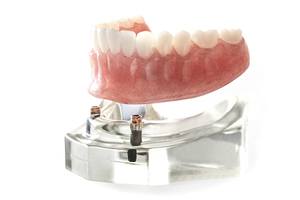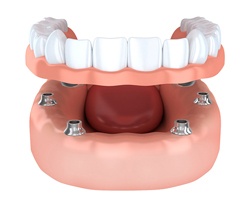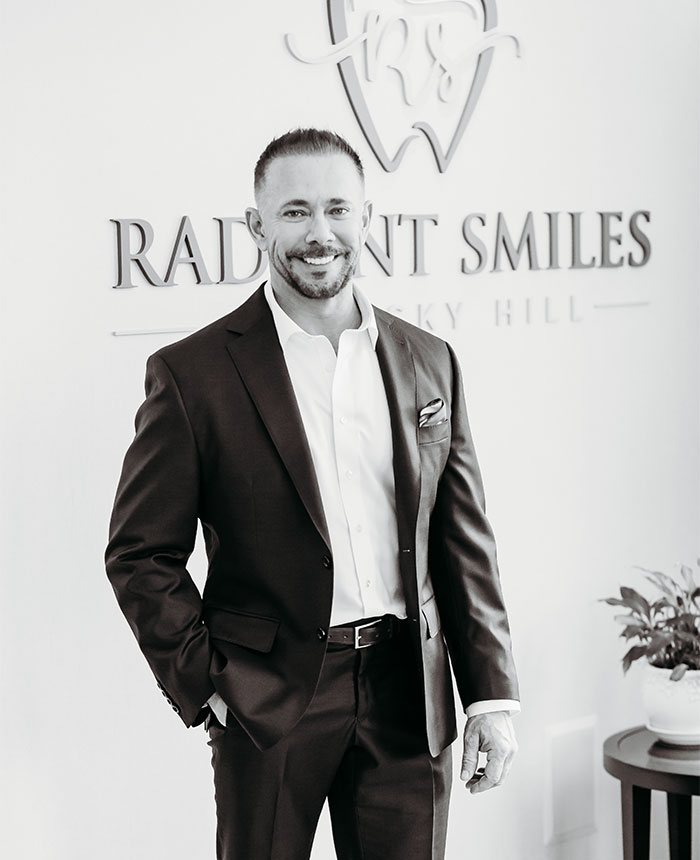Hartford Implant-Supported Dentures
Traditional dentures are an effective way to replace missing teeth, but for many individuals, they are far from ideal. That is why we often recommend implant-supported dentures to our patients who are good candidates for them. They are a comprehensive tooth replacement solution that offers a number of remarkable benefits.
implant-supported dentures to our patients who are good candidates for them. They are a comprehensive tooth replacement solution that offers a number of remarkable benefits.
WHAT ARE IMPLANT-SUPPORTED DENTURES?
Traditional dentures tend to not be very secure. Upper dentures are held in place by suction, while lower dentures rely on just gravity. They often need messy denture adhesive to stay in place. An implant-supported denture, on the other hand, is anchored in place by a series of small titanium cylinders that have been surgically placed within your jawbone. It usually takes four to six implants to support a full denture.
Both fixed (permanent) and removable implant dentures are available. In some cases, it is even possible for us to retrofit your traditional denture so that it is able to attach to implants. Other times, we have to create a new prosthesis to go with the implants.
WHAT ADVANTAGES DO IMPLANT-SUPPORTED DENTURES OFFER?
 Implant-retained dentures offer some significant advantages:
Implant-retained dentures offer some significant advantages:
- Bone stimulation. Implants stimulate the jaw, helping it to stay strong and full and avoid the bone loss that occurs when your teeth are gone. This progressive bone loss will result, in a period of ten to twenty years, in a condition called facial collapse that gives the face a shrunken and aged appearance.
- Because of this slow but steady resorption of your jawbone, the fit of your removable denture will gradually deteriorate and you will need a new denture every few years. After enough time, there may not be enough bone left to comfortably retain any kind of denture. This doesn’t happen when implants are present in the jaw.
- Traditional dentures sometimes slip out of place when their wearer is eating or speaking. Implants come with no risk of such uncomfortable and embarrassing incidents!
- A strong bite force. Implants allow you to eat almost anything without taking any special precautions.
- Implant dentures look extremely natural.
OPTIONS FOR IMPLANT-SUPPORTED DENTURES
There are various options for anchoring a denture with implants. The simplest and least expensive is an implant overdenture. Two or more implants, depending on how much you want to spend and the bone support available, are placed. After a healing period to allow the bone to fuse to the implants, a process called osseointegration, snaps are placed on the implants and in the denture allowing the denture to snap onto the implants. You can then remove the denture at home for cleaning.
A step up from this would be a fixed implant denture. Rather than snapping onto the implants, the denture is screwed on. This is more secure than the overdenture. Pink acrylic, to simulate gum tissue, is usually included. This is called a hybrid dental implant. If just the teeth are replaced, it is called an implant bridge.
A variation of the hybrid dental implant is the All-on-4 dental implants. In cases where there isn’t enough bone to support a traditional hybrid, some of the implants are inserted at angles to increase the retention. For more information about this option, please visit our All-on-4 page.
WHO IS A CANDIDATE?

In general, candidates for implant-retained dentures:
- Have suffered extensive tooth loss. If the tooth loss is fairly recent, there is a chance that enough bone remains in the jaw to support implants. If it has been some time since you lost your teeth, you may need a bone graft.
- Are free of gum disease and other serious oral and overall health concerns.
- Are patient. The entire implant process may take several months to a year.
- Have excellent oral hygiene habits. Keeping a clean mouth is essential for preventing infection after the placement surgery.
To learn more about dental implants and implant-retained dentures, contact our office. Dr. Michalski and the rest of our team look forward to helping you regain your lost smile!





